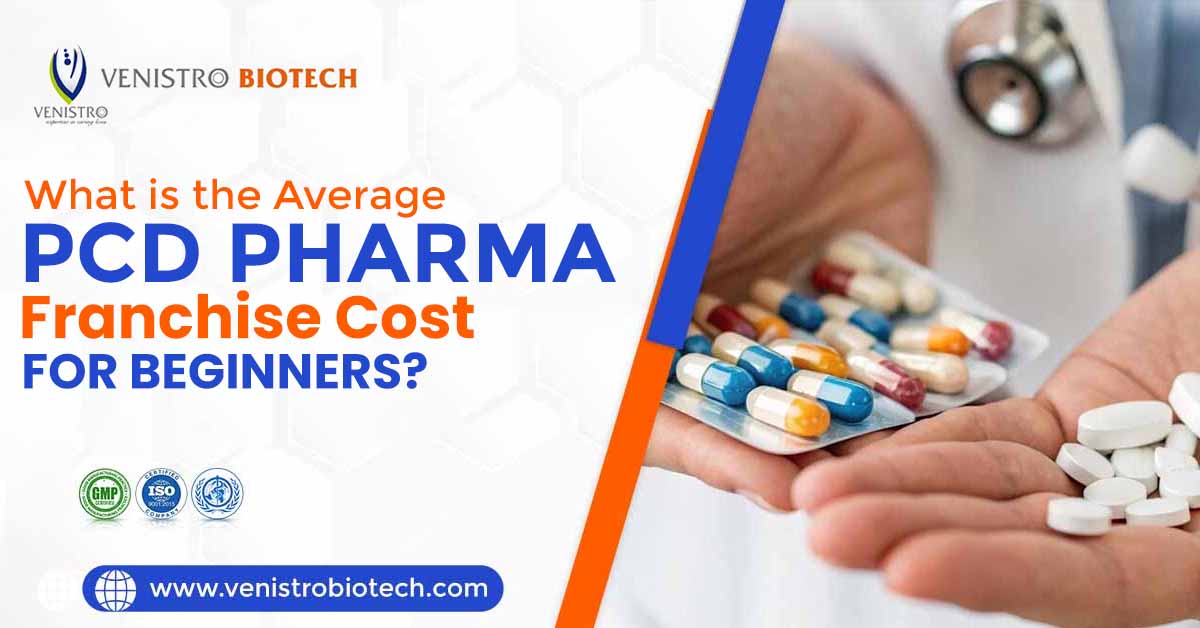PCD pharma franchise cost normally requires an initial investment of 2-15 lakh for conventional product lines. Also, specialized categories, such as injectables, critical care, oncology, or ophthalmology medicines, might cost up to 10 lakh-50 lakh or more, depending on complexity and market size. This industry cost is affected by various important factors. This includes types of pharma products like tablets, capsules, syrups, injectables, and high-value specialty medications. Moreover, company reputation and brand value and territory and monopoly rights. Thus, well-established brands often demand more investment, and exclusive rights to a given region typically increase expenses. In addition, initial stock requirements and positional support are very important. The minimum order quantity of pharmaceuticals directly affects the upfront cost, and promotional support may include MR kits, brochures, web marketing, and free samples, which also affect the cost of any franchise business.
Consequently, the PCD pharma franchise price varies depending on product kind, firm, location, and assistance supplied. While the investment may appear large, the possibility for consistent revenue and industry development in India’s pharmaceutical sector makes it a successful business opportunity.
What types of critical factors affect the average PCD pharma franchise cost?
Here’s a full explanation of the components that influence the average pharma franchise business expenditure in India:
- Pharmaceutical products offered:
The cost varies according to the kind of product (tablets, capsules, injectables, syrups, derma, softgel, etc.). Specialized or high-value items (critical care, oncology, and injectables) typically demand a larger expenditure. - Company reputation and brand value:
Top established, well-known pharmaceutical businesses charge more due to their brand reputation, market demand, and promotional assistance. Thus, newer or lesser-known enterprises may have reduced franchise costs. - Territory and monopoly rights:
Exclusive rights to a given geographic area might raise franchise costs, and also larger areas or cities with more market potential often cost more. - Initial stock and inventory requirement:
Companies typically need franchise partners to invest in a minimum product supply. Thus, the PCD pharma franchise price is determined by the number of items and the quantity of initial inventory. - Promotional and marketing assistance provided:
Leading pharma franchisee companies often offer MR kits, brochures, free samples, product visual aids, and digital marketing services and may include them in the first cost. This is also included with the high-quality promotional support that can marginally raise franchise costs while increasing economic potential. - Franchise type and model:
The most important factor is that PCD franchises with injectables or critical care items often demand a larger investment than basic medicines. In addition to this, costs vary depending on whether a franchise arrangement is exclusive or non-exclusive. - Registration, licensing, and legal fees:
The initial investment in this pharma franchise industry may include the cost of a drug license, GST registration, and municipal trade license. However, some firms offer support, while others ask partners to secure their own licenses.
Profit potential for the PCD Pharma franchise business
Here’s what we have: detailed points of the earning potential of the PCD pharma franchise business in India:
- High demand leads to consistent revenue:
Pharmaceuticals are vital items that maintain steady demand, and even small towns and semi-urban areas are seeing increased demand for pharmaceuticals. Furthermore, top franchisees selling common pharmaceuticals (tablets, capsules, and syrups) enjoy consistent monthly sales. Thus, niche areas such as derma, critical care, injectables, and ayurvedic treatments might create higher sales owing to specialized demand.
- Profit margin by product type:
Product segment typical profit margin:
- General medicines (tablets, pills): 15%-25%
- Syrup and liquids 18%-25%
- Derma and skincare products 20%-30%
- Critical care and injectables 25%-40%
- Factors impacting profit potential:
Increased product selection and demand lead to better sales, and also monopoly rights ensure no competition and higher sales. Moreover, a pricing strategy means that companies offering affordable yet competitive pricing boost turnover while retaining corporate profitability. Also, urban and semi-urban locations have more revenue potential than rural areas, although rural markets remain mostly unexplored.
- Typical ROI timeline:
Most franchisees begin generating profits within 6 months to a year, depending on their original investment, sales approach, and product demand. Additionally, specialized categories, such as injectables or critical care, might provide a faster ROI due to greater margins.
- Additional opportunities to increase profit:
Expanding product offerings means adding additional medications raises the average order value. Moreover, targeting hospitals and clinics proves b2b sales of critical care or specialist pharmaceuticals can dramatically increase income.
Finalization
We hope, after reading our above topic, that you all understand how the cost of a pharma franchisee business is affected by various things. Also, the company Venistro Biotech has given some top-demand products’ profit margin. Thus, for the interested pharma franchisee business professional, it is one of the important segments to learn about the PCD pharma franchise cost.

